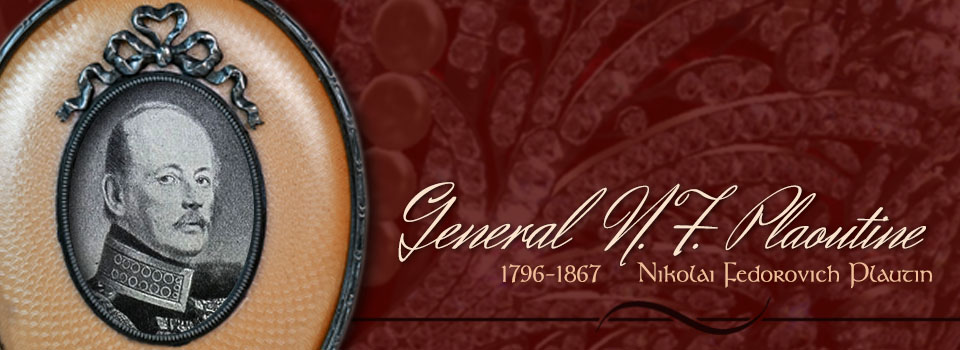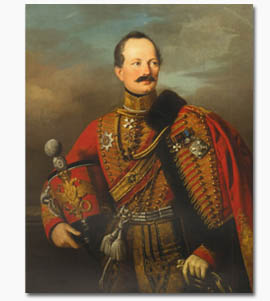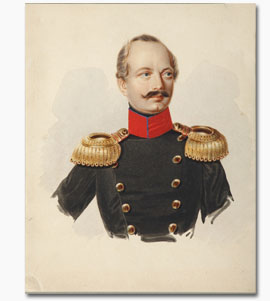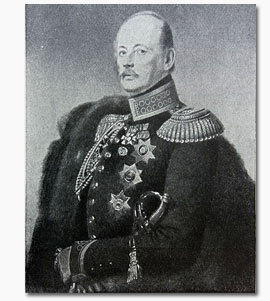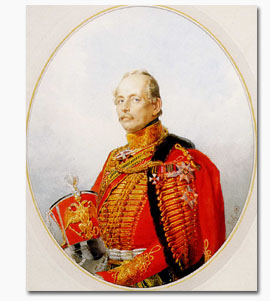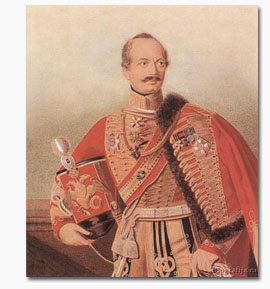Nikolai Fedorovich Plautin (1796 - 1867)
Person Notes:
— From the notes of Serge Plaoutine:
He had, in 1860, 256 serfs on 2,500 hectares in Bolchaia d. Kortcheva, and received a majority in Lublin after the suppression of the riot in Poland. He had land in the districts of Kostroma and Mokchany.
— Translated online from http://valuh.livejournal.com/39704.html:
Nikolai Fedorovich Plautin: Adjutant General, General of Cavalry (1856), a member of the State Council (1862).
Military career began at age 16 in 1812, when he joined the militia cornet in Kostroma (possibly attributing currently 2 years and due to the fact that the militia commanded by his uncle) and participated in the foreign campaigns of 1813-1814.
Later participated in Turkey (1828-1829), Poland (1831) and the Hungarian companies (1849), in 1856-1862. commanded the Grenadier Corps; boyfriend almost all orders of the Russian Empire. He was a member of the inner circle of Nicholas I. In the reign of Alexander II, one of the leading conductors of military reform, founded in 1857, the journal "Military Gazette", which became for many years the center of advanced military thought ...
Was the commander of the regiment, which served as a poet Lermontov (as some allege, uncle of the poet) at the time of the duel with de Barant in 1840. Was on friendly terms with Alex Wolfe, a close friend of Pushkin. Tesseli estate owned (by Foros).
Died treated in Nice, buried in the church at Tsarskoye Selo, and was born here - in the village of scribal.
— http://dic.academic.ru/dic.nsf/ruwiki/1096585:
(Translated online from Russian)
Born January 13, 1794 in the village of Scribal, Luhovskogo County, in the Kostroma Province. He was educated at the Moscow University boarding school.
On August 30, 1812, Plautin enrolled as Cornet in the cavalry regiment of the Kostroma Militia, and participated in the battles of the Duchy of Warsaw (also in Silesia, Bohemia and Saxony), and was in the battles of Dresden and Leipzig. From January 5 to February 6, 1814, he participated in the Siege of Magdeburg.
During the return trip to Russia (August 19, 1815), he was transferred to the Borisoglebsk Dragoon regiment. By (or on) 10 April 1816, Plautin joined the Life Guards Hussar Regiment and quickly drew the attention of his superiors.
On 22 January 1818, he was promoted to Lieutenant. On 23 November 1819, to the rank of Staff-Captain. On 02 August 1822, he became Adjutant General of Cavalry, and on 27 November 1824, he was appointed Adjutant to His Majesty (leaving the Life Guards Hussar Regiment). On 08 February 1825 he was promoted to Captain, and just over a year later, on 19 March 1826, he was promoted to Colonel. On December 6 of that year, he was awarded the Order St. Vladimir 4th degree, and, finally, on 27 April 1827 (at the beginning of the Turkish campaign) he was appointed Commander of the Hussar regiment the Prince of Orange.
In the Turkish campaign of 1828-1829, Plautin took an active part with his regiment and received numerous awards.
Crossing over the Danube at the end on May 1828 (in the composition of the order of Count Dibicha) he was awarded the bow to the Order of St . Vladimir 4th degree(on 8 June), for the difference in the battle at the fortress Kustendje. — For "excellent performance of the disposition under Shumla" was awarded on July 29 Order of Communication Anna 2nd degree, and on 23 August (for dealing with the village Kostezh) he received a diamond sign to this Order.
The following year, on 31 May 1829, Plautin led his regiment in a successful attack during the Battle of Kulevchi, knocking out the Turkish cavalry, which contributed much to the brilliant victory that day. For this achievment, he received the Order of St. George 4th degree on 05 October 1829.
Then, before the end of the campaign, he repeatedly took part in many battles as follows:
June 18, the conquest of the fortress of Silistra.
July 27, in a skirmish with Demerkioy village.
Finally, his last feat was the attack, on August 14, with his regiment and a Borisov Cossack regiment, against the Turkish Army located near the village of Morat. On 29 May 29 1830, Plautin was granted a golden sword inscribed "For Bravery" during the campaign of 1828-1829.
Since the beginning of the Polish campaign, he was sent with his regiment to the Galician border and participated in the successful battle with the troops on 6 and 7 April 1831. At Boremlya he suffered a spear wound in the leg, and in recognition of that (as well as for actions of his own in the Volyn province) he was awarded the rank of Major-General on 25 June 1831. After that, on 11 July, he was appointed commander of the 1st Brigade of the 6th Uhlans division, and on 19 December, of the 2nd Brigade of the 3rd Hussars division. At the same time, he led a successful attack (19 August), against the Polish cavalry, and made a sortie of the besieged fortress Zamosc. For the destruction(on 24 August) of a detachment of Polish insurgents near Janov, and for the prosecution (from September 3-6) of the body Romarinho, and some other Cavalry, he was granted the Order of St. Stanislaus 1st degree. He also received a mark of distinction "Virtuti Militari" for the Polish campaign at the end of 1831.
In memory of his participation in the Polish campaign and review at Kalisz, he was given the Prussian Order of the Red Eagle (2nd degree with the star) in 1835, and in the order of primogeniture in Poland.
On June 25, 1839, Plautin was appointed commander of the Life Guard Hussar Regiment, and exactly a month later as the commander of the 2nd Brigade of the 1st Cavalry Division Guards, leaving the post commander of the regiment. On 11 April 1843 Plautin was promoted to Lieutenant General with the appointment of the Commander of the 2nd Brigade of the Guards Cuirassier Division. On 09 May 1844, he was appointed head of the 2nd Light Guards Cavalry Division, and finally, on 21 January 1849, as Adjutant General of His Majesty. During this same time, he received several Russian and Foreign awards:
September 4, 1837: Order of St. Anna 1st degree
6 December 1839: Diamond Marks for the Order of St. Anna 1st degree
6 December 1842: Prussian Order of the Red Eagle (with a star, decorated with diamonds); a snuff-box, adorned with diamonds with the portrait of the King of Prussia; and the Order of St. Vladimir 2nd degree
6 December 1845: Order of the White Eagle
Plautin took part in the Hungarian campaign of 1849, adding another series of triumphs and awards to his career. On July 5, he scored a successful prosecution of the enemy near Weitz; on 13 July he mastered a crossing by Tisza at the village of Tissa-Fyured; on July 21, broke the enemy at Debrechine (for this victory he was awarded the Order of St. Alexander Nevsky on 29 July). More awards followed:
May 25: Austrian Order of Leopold, 1st degree
July 25: Prussian Order of the Red Eagle, 1st class
July 25: Dutch Military Order of William, 3rd degree.
In 1851, the King made him Virtembergsky, in remembrance of his participation in the Hungarian Campaign, and Knight of the Order of the Crown of the 1st degree. In addition to this, he was given a reward of 500 ducats.
Upon his return to Russia, Plautin was appointed member of the Committee for the Wounded (February 24, 1853), and on 29 November 1854, the commander of the Grenadier Corps. During the Crimean War in 1855 he was with the troops from Perekop, then in Simferopol and Karasubazar.
On 23 June 1856, Plautin was made a General of the Cavalry (and after given an award on 26 August), and the appointment of a separate Guards Corps commander. On 30 September, he was made Chairman of the Imperial Approval of the Commission for Improvements in the Military Unit. In 1856-1862, Plautin played a prominent role as the first member, and later chairman of the commission that prepared Milyutin military reforms.
Plautin remained the commander of the Guards Corps until his appointment on 30 August 1862 as a member of the State Council. He attended the meetings of the Department of Civil and Religious Affairs and the Commission to consider the reports of the War Ministry. During this time he received several more top awards:
August 30, 1857: Diamond Marks to the Order of St. Alexander Nevsky
October 26, 1857: Prussian Order of Red Eagle, 1st degree with diamonds
September 8, 1859: St. Vladimir, 1st class with swords
8 September 1860: Order of Peter Friedrich Ludwig of Oldenburg, 1st class
August 30, 1862: (at the Imperial rescript) Order of St. Andrew
And also, on 12 April 1857, Plautin was awarded the Imperial rescript which read: "Николай Федорович! Во время лагерного нынешним летом
сбора войск отдельного Гвардейского корпуса с
прикомандированными к ним частями, Я с душевным
удовольствием удостоверился, что все части вверенных Вам
войск находятся в отличном состоянии. Приятно было мне
видеть, с каким пламенным усердием войска исполняли
служебные обязанности; знание дела, порядок,
неутомимость, бодрый и веселый вид заслуживают полной и
совершенной похвалы, но в особенности меня радует
замечательно малое число больных, служащее
доказательством, что на сбережение нижних чинов обращено
попечительное внимание. Сердечно благодарю Вас за Ваши
неусыпные заботы о войсках, под начальством Вашим стоящих
и за доведение оных до настоящего блистательного
состояния. Пребываю к Вам неизменно благосклонный,
Александр"
As a member of the State Council, Plautin participated in the discussion of 14, 16 and 17 December 1863, being the Project Zemstvo Reform and, incidentally, was one of 29 members to speak out against 17 other members on the chairmanship of the Provincial Zemstvo Assemblies for providing its provincial the leader of the nobility, not the person elected assembly.
Illness soon prevented Plautin from continuing his work at the Council of State. He moved to Nice, where he died on December 24, 1866. He was buried in the Church at the Kazan Cemetery in Tsarskoye Selo.
— "Moniteur Belge: Journal Officiel" Belgique, 1854, page 4312:
L'aide de camp général Plaoutine est nommé commandant du corps des grenadiers, en conservant sa dignité d'aide de camp général et son emploi de membre du comite institue le 18 aout 1814 (comite des Invalides).
Sources:
1 Genealogy of the Plaoutine Family by Serge Nikolaievitch Plaoutine (French Document in the Collection of the British Library)
2 Death Certificate (Nice, France)
